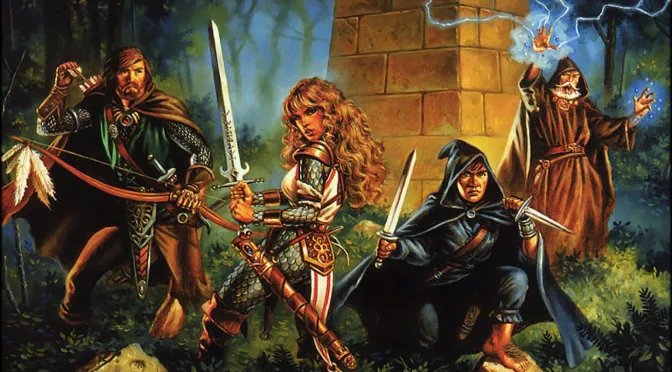Tips for new D&D players
Clyde Caldwell, cover for AD&D module 11: Needle by Frank Mentzer
Ask the GM.
You can always ask for more details about locations, objects, and NPCs.
Ask NPCs about the local news, a rumor you’ve heard, the smoke rising from the woods outside of town, the traveling merchant you met on the road, or their opinion on the king.
Ask for more details about locations. The Game Master can't describe everything in an area so you have to ask. Ask if there is a local market, alchemist, blacksmith, or haberdasher. Ask if there is a village nearby, an inn, a farm, or a local landmark. If it would make sense, it’s probably there.
Ask about the environment. Ask what the walls are made of, how tall the statue is, what the cavern smells like, and whether there is an echo. You never know what small details may help you.
If the GM doesn't know the answer, offer a reasonable suggestion. If no one knows the answer, the GM can ask the dice! Roll 1d6, on a 1-3 the answer is unfavorable. On a 4-6 the answer is favorable.
State your intent
Don’t only tell the GM what your character does, also tell the GM what you are trying to accomplish.
If you tell the GM your goal, they can help you achieve it by giving you information you may have been missing.
Stating your intent can often uncover misunderstandings between the players and the GM.
Prepare for your adventure
Ask about the path ahead of you. What dangers lie on the road? What obstacles are in the woods? Who in town knew the bandit king when he was a street rat in town?
Can you buy a map? Can you hire a guide? How can you keep yourself from getting lost?
What kind of equipment would be helpful where you are going? Buy it before you leave.
Make sure to have plenty of rations and healing potions.
Talk to your other adventurers and make a plan. Who is leading the party? What supplies does everyone have? What spells has everyone prepared? What do you do in an ambush? When should your party fight? When should you flee?
Search everywhere
The GM will describe the interesting things in any scene. Not everything is important or contains secrets, but you won’t know until you look.
Examine the painting and look for irregularities in the brush strokes. Look behind the painting for something concealed. Look on the back of the painting for a hidden message.
Look for irregularities in the map. Tap on the stone bricks with your sword. Blow chalk dust near the floor to detect a flow of air. Secret doors could be anywhere.
Climb to a high place to get a view of your surroundings.
Use your environment
Think of all the ways you could use the environment to gain an advantage.
The high ground will give you an advantage on ranged attacks.
Hiding behind something will give you cover.
An enemy who is falling off a 50-foot tower can’t fight back.
Fire is destructive and unpredictable, use it wisely.
Doorways are choke points to keep yourself from being surrounded.
Use a gust of wind to kick up dust at your enemies.
Cause a distraction and lure enemies into a disadvantageous position.
Make friends and call in favors.
NPCs have access to information, tools, skills, and other NPCs your character does not have.
Find out what NPCs want, and figure out how to be useful to them. Once an NPC trusts you, they can share things with you.
Ask the people of a village you've rescued to help you search the woods.
Ask a blacksmith to help you break the manacles, or fix a broken sword.
Ask the merchant to send a letter of introduction to his friends in another town.
Ask the mayor to let you store your pet gelatinous cube in the dungeon of the keep.
Ask the necromancer whose life you spared to cast speak with dead for you.
Use your character
Know how your character abilities work and know the mechanics of the game enough to use them well.
Know what skills your character is proficient in, and find ways to use them in interesting ways.
Know what your character is carrying with them. Imagine how these items work in the real world. Be creative with their uses. Practice right now. Think of 10 ways to use a rope, manacles, metal spikes, a hammer, or a shovel.
Remember your character's background and use it. Were you formerly a bandit? Let the GM know this when you are talking with the bandits, it may grant you an advantage.
